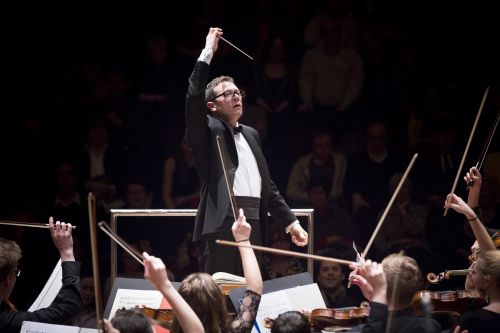 United Kingdom Holst, Ireland, Walton, Bax: BBC Philharmonic / John Wilson (conductor). BBC Philharmonic Studio, MediaCityUK, Salford Quays, 10.4.2019. (RBa)
United Kingdom Holst, Ireland, Walton, Bax: BBC Philharmonic / John Wilson (conductor). BBC Philharmonic Studio, MediaCityUK, Salford Quays, 10.4.2019. (RBa)

Holst – The Perfect Fool, Ballet Music (1918-1922)
Ireland – The Forgotten Rite (1913)
Walton – Façade (selection) (1922-1926/1938)
Bax – The Garden of Fand (1913-1916)
Some conductors – very few – have a halo of the sensational about them. André Previn was one such, and that also is the case with John Wilson. Wilson couples this star quality with a personable approach, outgoing charm, intrepid engagement with the repertoire, and incisive music-making. He first won his spurs with various Coates CDs, and even more so with the world of musicals and film music. For the last decade or so, he has shown that his horizons are wider and his perspective deeper. We can cite his work on the orchestral output of Copland, Richard Rodney Bennett, Vaughan Williams and Bax. Let us hope that he will continue to work with the BBC Philharmonic.
The packed-out afternoon concert saw a sunny but chilly Salford Quays and an orchestra without its usual leader Yuri Torchinsky or clarinettist John Bradbury. The orchestra’s traditions remained in gifted hands, including various key and prominent parts for leader for the day, Zoe Bayliss.
Holst’s Perfect Fool sequence seemed less a compendium of three elemental dances (Earth, Water and Fire) and more of a continuous and brilliant narrative. About the length of concert overture, it got the concert off to an electrifying start with display safely in the hands of the eruptive brass, and with poetry spun by solos for cello and for harp. The central section (Dance of the Spirits of Water) has some eerie writing; Wilson had the Magician enwrapped in smoke, pops, fireworks and starbursts. In the air there was the suggestion of black smoke and gun-powder.
The Holst work makes the perfect foil to Dukas’s L’Apprenti Sorcier. It is about time the whole opera was heard – at least on radio. The last time that happened was in the 1960s with Charles Groves and the 1990s with Vernon Handley. Ignore the naysayers who say that the opera does not work. It may be an awkward length at 65 minutes, but it can succeed just as easily as the two Ravel operas. The premiere of the Holst took place in 1923. Eugene Goossens conducted and Maggie Teyte was among the singers.
Next came John Ireland’s little tone poem The Forgotten Rite. This delicately wispy and impressionistic piece ideally suited the MediaCity acoustic. It may be short , a mere seven minutes, but it is long on atmosphere. Celesta and harp contributed to the magic. Wilson, who conducted with baton, is far from impassive on the podium. He has a most eloquent and actively expressive left hand, which clearly signals mood and dynamics.
Next came eight diminutive movements for full orchestra from Façade. They are display pieces, which Walton cuttingly stropped for satirical effect. Normally the full orchestra tends to weigh this music down but for the most part it took wing and flew. Highlights were the 1920s dance-band evocation carried by saxophone and woodblocks, a briefly glimpsed vignette of pot-plants and chandeliers along the lines of Barber’s Souvenirs suite, and the final Sevillana which made whoopee with Chabrier’s España and other hispanic clichés.
The concert ended with one of Arnold Bax’s three tone poems, The Garden of Fand. The others, Tintagel and November Woods, are bound up with legend in one case and landscape in the other. They reflect the psycho-drama of Bax’s conflicted love life. Fand may have elements of this as well but, like the earlier and brilliant In the Faery Hills, seems primarily to reference Celtic legend and Fand’s fatal enchantments. Its story is little like the ‘plotline’ in Balakirev’s Thamar. Fand’s marine splendours are more intimate than the oceanic cliff-top dramas of Tintagel. Fand was premiered in 1920 by the Chicago Symphony Orchestra conducted by Frederick Stock. That is some measure of Bax’s standing before the Second World War. He has still not regained that place.
Wilson’s reading was notable for combined speed and urgency. The great storm that sinks the Garden beneath the waves was done with such force that, for the first time in my experience, the music was made to look forward to the tempest in Sibelius’s Tapiola, a work which in 1916 lay in the future. It is as good as quoted in one section of the finale of Bax’s Sixth Symphony but that was written after the Sibelius work. Otherwise, Fand glowed with buffeting fanfares for the French horns, and gleamed and shivered in sea-spume under the gentle ministrations of two harps and celesta. Poetic moments were legion, including several interventions for the leader’s solo violin. I hope that Wilson and the BBCPO will now turn their hands to a symphony or two. They would be bound to make headlines with numbers 5 or 6.
The concert, which was a live relay on BBC Radio 3, ended unusually with a romping rapped out encore, In Town Tonight by – as Wilson announced – Bax’s ‘best mate’, Eric Coates.
On 13 April, at the Bridgewater Hall, this orchestra and conductor indulge Manchester with another all-English programme: Bax’s November Woods, Walton’s Violin Concerto and Vaughan Williams’s Fourth Symphony.
Rob Barnett
For more about BBCPO click here.
